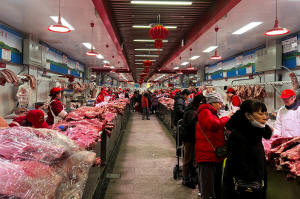China's consumer prices swing up on seasonal Lunar New Year gains
 Send a link to a friend
Send a link to a friend
 [March 09, 2024] By
Ryan Woo and Liangping Gao [March 09, 2024] By
Ryan Woo and Liangping Gao
BEIJING (Reuters) -China's consumer prices rose for the first time in
six months due to spending linked to the Lunar New Year, offering some
reprieve for the world's second-biggest economy grappling with weak
consumer sentiment, while factory-gate prices fell again.
The consumer price index (CPI) climbed 0.7% year-on-year in February,
data from the National Bureau of Statistics (NBS) showed on Saturday,
beating the 0.3% gain forecast by economists in a Reuters poll.
The year-on-year growth in consumer prices was also the highest in 11
months, buoyed by gains in some key foodstuffs such as pork and fresh
vegetables, as well as travel amid a seasonal rush around Lunar New Year
in February, according to the NBS data.
The bounce into positive territory contrasted with the 0.8% fall in
January, the steepest drop in over 14 years, due to a higher statistical
base in January 2023 as the Lunar New Year arrived earlier that month
and boosted spending.
While other recent indicators, such as much stronger-than-expected trade
figures this week, have suggested improvement in some parts of the
economy, analysts warn that a full-throttled recovery is not yet in the
cards.
"It is too early to conclude that deflation in China is over," said
Zhiwei Zhang, president and chief economist at Pinpoint Asset
Management.
"Domestic demand is still quite weak. Property sales of new apartments
have not stabilised yet."
In February this year, CPI rose 1.0% month-on-month, outpacing the 0.3%
uptick in January and the 0.7% growth forecast by economists.
But the producer price index (PPI) fell 2.7% from a year earlier in
February versus a 2.5% drop the previous month. That was faster than a
2.5% decline forecast in the Reuters poll. Producer prices have declined
for more than 1-1/2 years.
The risk of deflation due to continued weak demand remains one of the
main drags on China's overall growth.

[to top of second column] |

Pork sellers attend to customers at the Xinfadi wholesale market in
Beijing, China February 2, 2024. REUTERS/Mei Mei Chu/File photo

In January-February, CPI was unchanged from a year earlier, with
food prices down 3.4% and non-food prices 0.9% lower.
China has been grappling with sub-par growth over the past year amid
an entrenched debt crisis among the country's property developers
that had crushed home-buying sentiment and rocked what was once a
mighty pillar of the economy.
Weak international trade flows, declining domestic investment, and
high local government debt further sapped economic growth.
Policymakers have pledged to roll out new measures, promising to
unleash "new productive forces".
The head of China's central bank said on Wednesday there was room to
cut the amount of cash that commercial banks set aside as reserves,
following 50 basis points of cuts in banks' reserve ratio
requirement (RRR) in January, the biggest in two years.
Premier Li Qiang on Tuesday announced an ambitious economic growth
target of around 5%, although economists said the goal would be
harder to reach as a post-COVID recovery loses steam. The
International Monetary Fund has predicted China's growth to ease to
4.6% from 5.2% last year.
Li also set a 2024 inflation target of 3%, in line with goals set
since 2015. Consumer prices rose 0.2% last year, missing the
government's target.
"We only expect a modest recovery in CPI and PPI inflation despite
the CPI inflation target of 3%, and a deeper property downturn may
pose greater deflationary risk," said economists at UBS in a
research note this week.
(Reporting by Ryan Woo and Liangping Gao; Editing by Sam Holmes)
[© 2024 Thomson Reuters. All rights
reserved.]
This material may not be published,
broadcast, rewritten or redistributed.
Thompson Reuters is solely responsible for this content. |